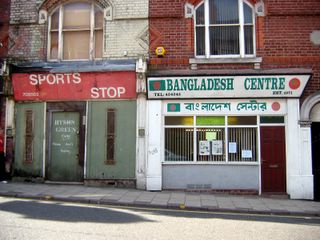* *
I was wandering through an ethnic ghetto of Blighty today. My white colleagues are scared of the place, but the shops there sell mangoes and lots of exotic fruit juices (I like lychee, guava, mango, and pomegrenate), so I like going there.

ghetto

Also of course there is the pleasure of being surrounded by so many cultural artifacts of Desh (for many of the ethnics are from Desh. There are others from Africa and Caribbean, there are Arabs and Persians, and poor white people too). The smells and sounds of Desh make me hearken for my country. I like how the Sikh Gurudwara is next to Faiz Convenience Store. I like how the old sikh gentleman buying melons exchanges courteous pleasantries in Punjabi with the studious young man with long-beard and skull cap behind the counter.
I dislike though the profusion of religious symbols. They are everywhere - hanging from the mirrors of cars, in the windows of the houses, on the names of the shops. I know people who choose which sweet-shop they visit according to which religion it identifies with. Do sweets have a religion I ask you? But sweet-shops here do. Maybe these people like their religion, maybe it gives them succour and comfort and pleasure, salvation even. But I personally have a long aversion to religion and its ability to divide people, have long been bitter about its consequences for Desh, and indeed for humanity in general, and as Faiz may have said - this ghetto is not the country I hearken for.
Yes, I know. The places we dream of are imaginary homelands. Sigh.
***
Notice in the photo above the promptness of the Bangladeshi community. Bangladesh, established 1971. Bangladesh Centre, also established 1971.
***
And yet, perhaps these assertions of religion are not proclamations of division, but of defiance. The mosques and gurudwaras of the ghetto are among the most unwelcoming buildings I have seen. The doors are closed, the gates are shut, the windows barred with metal. There are video cameras, and high walls, and warnings of CCTV and security systems in place. These are fortresses, not the open places of worship I am used to. But they reflect the reality the people of the ghetto live in, where even the houses of God are not safe from greed, malice and hate. In such an environment, perhaps the proclamation of religious identity should be seen as an act of courage and defiance, a defence of that aspect of their identity which they see as being most threatened.
***
With a "curry house" in even the smallest towns, they are starting to run out of original names. Run of the mill names with "Balti" and "Curry" in them proliferate. Curry 2000's name used to put me off while I was in the East End, but luckily I went in once and discovered that the guy's mother made
Ranchi
Bihari Takeaway
is the fantastic proclamation outside. Surely the first and only Bihari takeaway in the western world.
***
